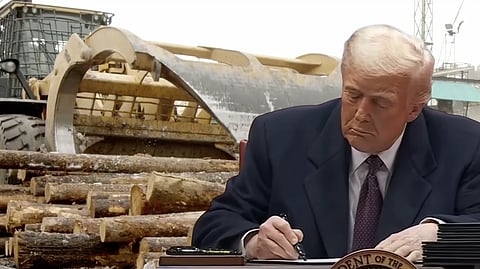Trump slammed for attacking Canadian lumber industry via 'ludicrous' new executive order
Donald Trump has faced backlash over new executive orders he signed attacking Canada's softwood lumber industry and vowing to expand domestic production by partially eliminating environmental requirements.
In his order, the president claimed importing wood products from north of the 49th parallel could pose a "threat to national security," and asked the secretary of commerce to launch an investigation to determine whether the perceived effects warranted further action.
Among those who called Trump out was Unifor, Canada's largest private sector union.
"To suggest our lumber and byproducts are a threat to American security is ludicrous," president Lana Payne said, "but Trump is going back to his playbook to twist regulations to continue sustained attacks on the Canadian softwood industry and the jobs that depend on it."
Unifor predicted that if the investigation reveals anything the administration may see as potentially threatening, additional tariffs could be placed on Canadian lumber in addition to those that already exist, and those Trump has vowed to impose on all products entering the United States from Canada.
"The existing unjustified duties have already hurt our industry, resulting in job loss and production slowdowns," Unifor Quebec Director Daniel Cloutier added. "Now Trump aims to pile tariff on top of tariff to further weaken our forestry sector with the goal to price our industry out of existence."
He explained that regardless of how the president feels, "the reality is the U.S. needs to import lumber, and tariffs will further drive-up prices on American consumers, particularly home-buyers."
"It's clear the attacks from Trump will keep coming," Payne concluded, "so Canada must have responses in place while taking simultaneous action to safeguard and develop our industries to protect good paying jobs."
British Columbia Forestry Minister Ravi Parmar also slammed Trump over the move.
"These trade barriers will only serve as a tax on middle-class Americans trying to build new homes and on communities devastated by wildfires and hurricanes, forcing them to pay more to rebuild," he said, per the . "The US would rather abandon its environmental standards than trade fairly with other countries."
The United States has long been British Columbia's largest export market for forest products, with softwood lumber from the province making up 11% of all that Americans use.


